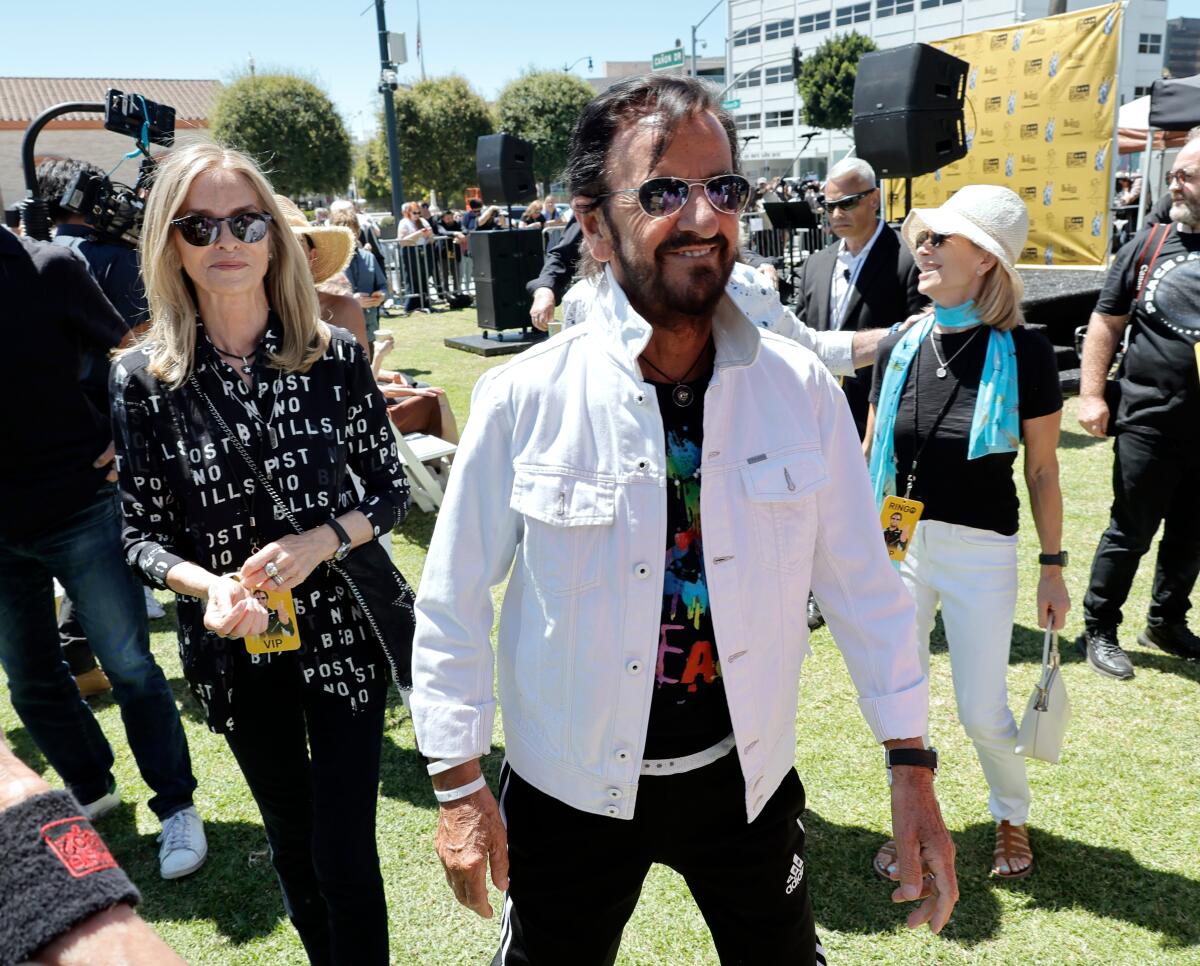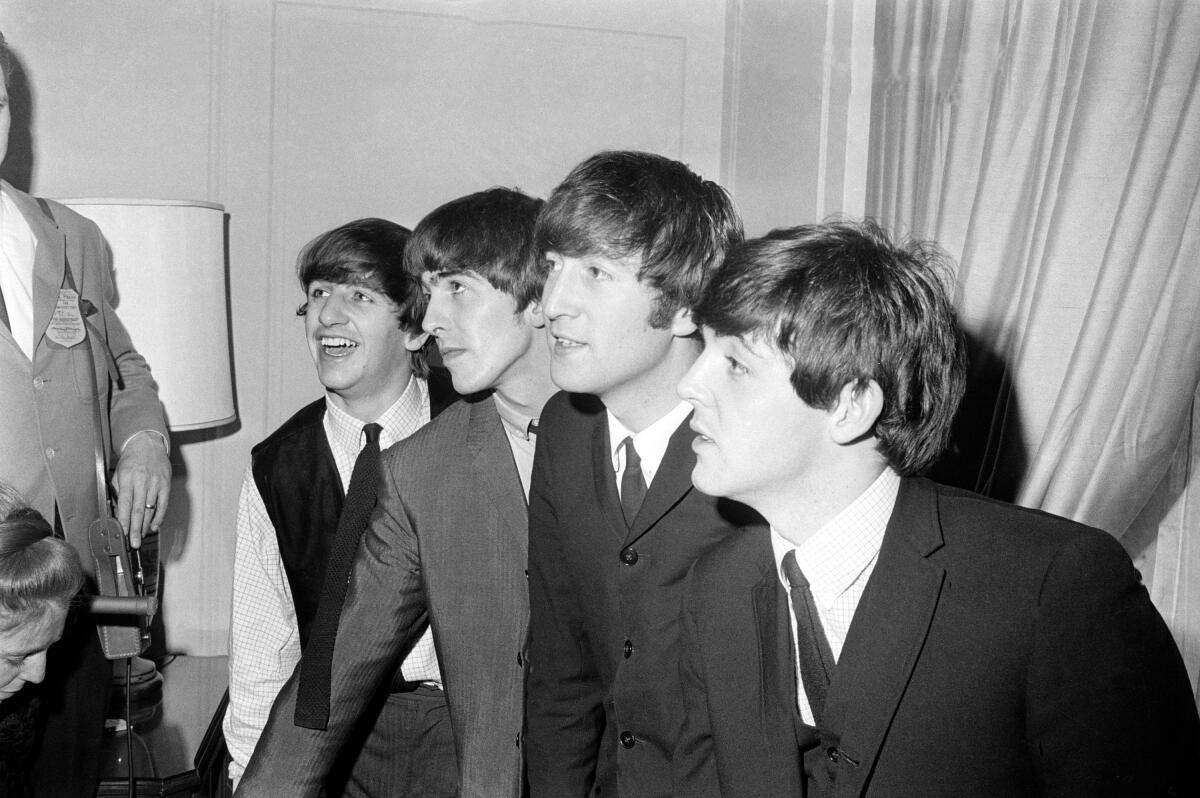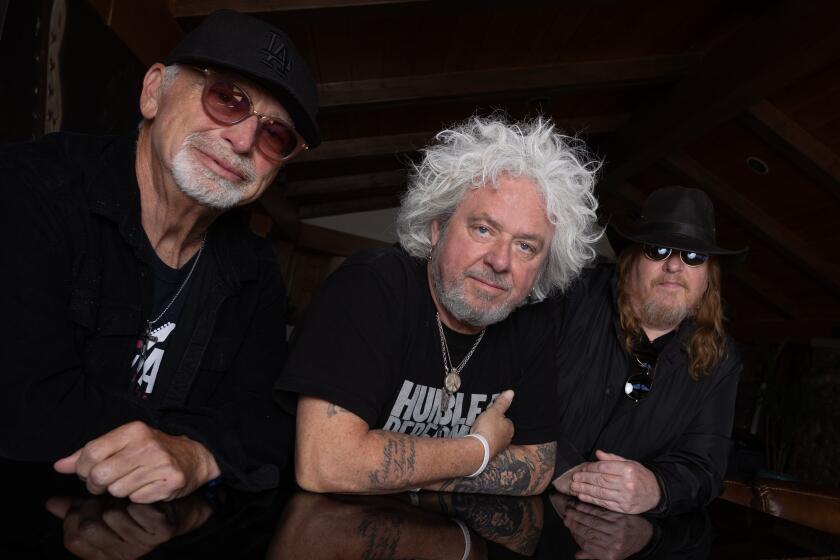From Beatle to boss: Ringo Starr on running his All-Starr Band

- Share via
Ringo Starr moseys up to the restaurant at the Sunset Marquis in a spotless white cowboy hat and matching white denim jacket.
The former Beatles drummer, 84, is at the hotel in West Hollywood shooting photos for a country record he’s finishing up with producer T Bone Burnett — a kind of sequel, half a century later, to 1970’s “Beaucoups of Blues,” which itself built on his lead-vocal turns with the Fab Four in a cover of Buck Owens’ “Act Naturally” and in the White Album’s loping “Don’t Pass Me By,” which he wrote.
“But don’t ask me any questions about that,” Starr says cheerfully of the upcoming LP. “That’ll be later.”
For the moment, he’s focused on a tour with his All-Starr Band that’s set to launch Saturday in San Diego before stopping at the Greek Theatre on Sunday night. Drawn from the countless relationships he’s developed with musicians over the decades, the All-Starr Band puts the legend born Richard Starkey in front of a rotating group of well-traveled players — the current members are Steve Lukather, Colin Hay, Warren Ham, Hamish Stuart, Buck Johnson and Gregg Bissonette — for a jovial revue of classic rock hits.
Ahead of their Hollywood Bowl debut on Sunday night, Steve Lukather, David Paich and Joseph Williams of L.A.’s Toto look back at the band’s singular career.
“We rehearsed Saturday and Sunday; that’s about all we need,” says Starr, who’s lived largely in Los Angeles since the early 1990s and who’s looking relaxed on this recent afternoon after a staycation in Malibu with his wife, actress Barbara Starkey (formerly Barbara Bach), and some of their children and grandchildren.
“We also had Barbara’s sister, Marjorie, and Joe,” Starr adds, strumming an imaginary guitar to indicate his famous brother-in-law, Joe Walsh of the Eagles, who married Marjorie Bach in 2008, years after doing a stint in the first All-Starr Band. “Just had an incredible time.”
What do your grandkids call you?
Granddad. One of my grandchildren, she just had a baby, and we were trying to get him to say “great-granddad.” But I’ve ended up as GG. He made it up.
Who in your life calls you Richie or Rich, as opposed to Ringo?
All my family — it’s Richie. Or Dad. Or Darling.
Anyone use the full Richard?
Sometimes Barbara when she’s angry: “Richard!” But that’s like twice a year.

Tell me about assembling the All-Starr Band, which originally grew out of an overture from Pepsi, right?
It happened in 1989. Pepsi had gotten to a person who got to a person who knew me, and they were wondering if I’d go on tour. I said OK, and then I thought, “What do you mean, OK? You’ve never put a band together. So what happens?” I get the phone book out — it’s 1989, so it was a physical phone book — and I called Joe Walsh: “Man, they’re asking me to go on tour. I don’t have a band. You wanna be in the band?” He said sure.
Joe Walsh’s number was in the phone book in 1989?
Yeah, yeah. We also had Nils Lofgren — he was a friend anyway, so he said yes. Dr. John had been on the [“Ringo’s Rotogravure”] album, and I called him. That was a funny story because he could get a bit rough — could be hard to understand what he was saying. So I called this guy who was helping me, and I said, “Well, I just spoke to Dr. John, and I don’t think he wants to do it.” The guy said, “He just called me, and he thinks you don’t want him.” Then I thought of Levon [Helm] and Rick [Danko] from the Band, and they said yes. I had to stop calling people because everyone was saying yes.
Indeed, the first band had three drummers.
Because of my insecurity. I had Levon on drums, I was on drums and Jim Keltner was on drums. But it worked. In those days, there used to be a 1-800 number you called to buy records. We were the best 1-800 band in the land.
Nearly a decade after the death of his 15-year-old son, the Australian post-punk bard has a new album, ‘Wild God,’ that he says finds a path to joy.
I spoke recently with Steve Lukather, who basically regards you as a hero. Is it ever strange to play with guys who look up to you so reverently?
It’s great [laughs]. Luke’s a good friend. But everybody onstage has their own space, and everyone’s there for each other. I give this speech every time we put it together: “Look, I’m gonna do my best for you, and all I want is for you to do your best for me and for him, and for him, and for him.” I had some members in the ’90s who didn’t really get the system. One of them came to me and was complaining about another player. He said, “I’ll have to leave,” and I said, “OK — you’re not gonna blackmail me.” He didn’t leave.
Are you a natural at hiring and firing?
Yeah. There’s been the odd musician who felt — well, they didn’t feel bigger than me because they weren’t — but felt like they had the right to change things. If we do a tour and it’s been too rough: “I’m afraid you’re out the band.” Or if it’s just really bad taste. We had one player that just played crap.
Would you care to name him?
No.
I discovered that Sunday’s Greek show will come 35 years almost to the day since the All-Starr Band’s first gig there on Sept. 3, 1989.
I remember it like it was yesterday. It was so clear that night. A lot of actors came out. L.A. was becoming the place for me. We bought a house in ’92, Barbara and I. [Before that], I was a resident of Monte Carlo, so we’d have to move around a lot. She reminds me occasionally about when we first met and we were renting a house in L.A.

You remember where?
Bedford, off Sunset. We were hanging out, doing our stuff, but I was only allowed here three months. I’d say, “We’ll have to leave by Tuesday…” We had to call her mom and dad to look after the kids. Not like that now — we’re more settled.
Are you a U.S. citizen?
No.
I asked Keith Richards that question a couple years ago. He said, “Get the f— out of here.” What’s your attitude?
Blooming well no [laughs].
You’ve lived here for close to 40 years.
Yeah, but I’m English, and my kids and my family are over there. It’s not like I’m just on my own. And it’s a lot of deep memories over there. I don’t have to be an American to be in America. I’m American-style. When we first came here, in ’64, I was dressed up in a poncho with a holster and a toy gun. We went over to Burt Lancaster’s, and he said, “Ringo, what are you doing?” I said, “Man, I’m in L.A. — I’m a cowboy.” And the result of that was he sent me a beautiful belt and two six-guns, which I still have.
A lot of other British musicians have ended up here over the years: Rod Stewart, Jeff Lynne, Dave Stewart.
Dave actually lives in another country now. We played together in Liverpool in 2008 [at a concert meant to recognize the city’s role as a capital of European culture]. While we were doing that, the school I went to, Dingle Vale, they had these fields — they wanted to call them Starr Fields, and would I go and open it for them? I was never sporty, but I’d mark out the pitch.
Why weren’t you sporty?
Just didn’t attract me. Even then I was deeply a musician.
You last played with Paul McCartney at Dodger Stadium in 2019. Think we’ll see such a moment again?
I don’t know — we might. I played with him at the O2 in England [in 2018]. Then he played here, and I got up and did a couple of songs with him. It was a thrill. There’s a connection between the bass player and the drummer, you know. You’re both the deep end of it all. Paul’s the man — and he’s still the most magical bass player I know.
More to Read
The biggest entertainment stories
Get our big stories about Hollywood, film, television, music, arts, culture and more right in your inbox as soon as they publish.
You may occasionally receive promotional content from the Los Angeles Times.












